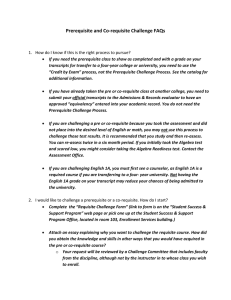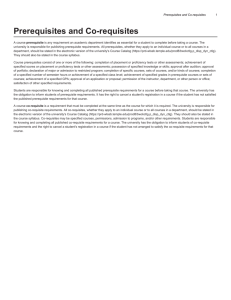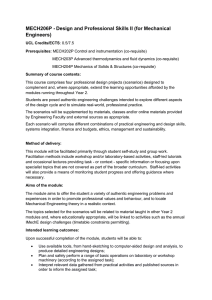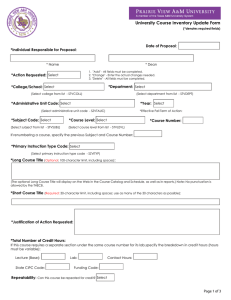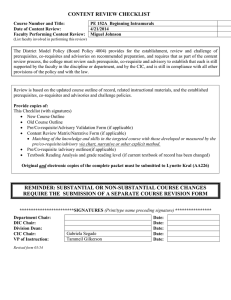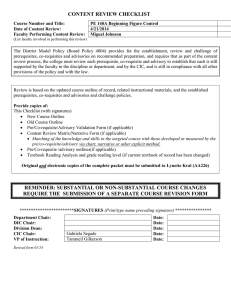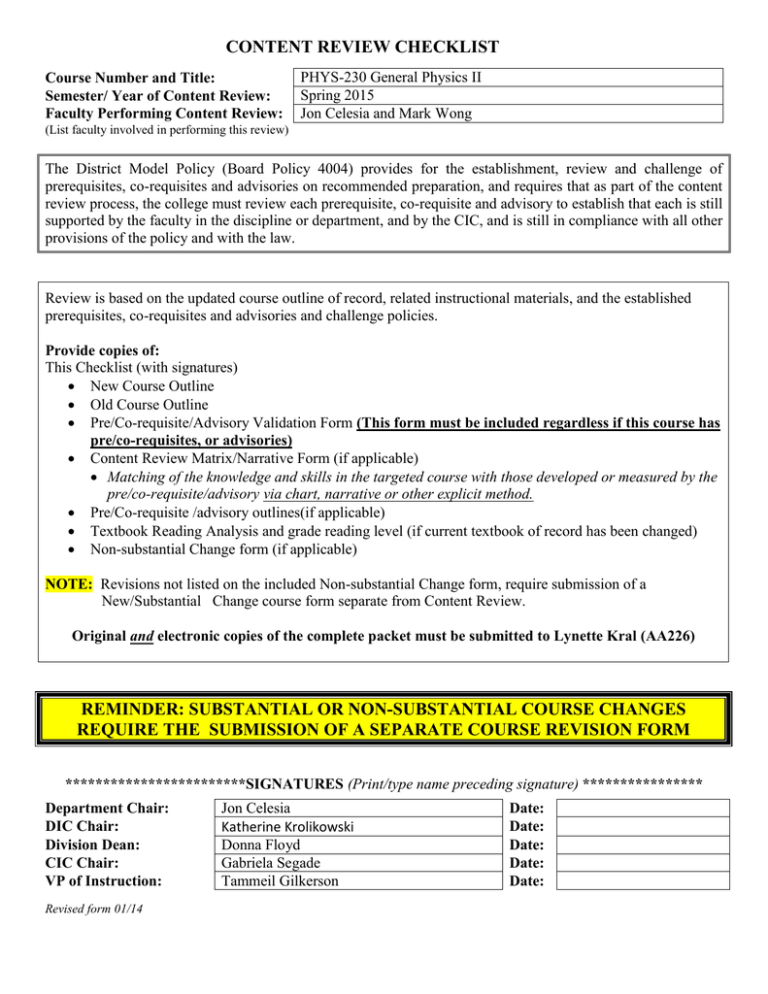
CONTENT REVIEW CHECKLIST
Course Number and Title:
Semester/ Year of Content Review:
Faculty Performing Content Review:
PHYS-230 General Physics II
Spring 2015
Jon Celesia and Mark Wong
(List faculty involved in performing this review)
The District Model Policy (Board Policy 4004) provides for the establishment, review and challenge of
prerequisites, co-requisites and advisories on recommended preparation, and requires that as part of the content
review process, the college must review each prerequisite, co-requisite and advisory to establish that each is still
supported by the faculty in the discipline or department, and by the CIC, and is still in compliance with all other
provisions of the policy and with the law.
Review is based on the updated course outline of record, related instructional materials, and the established
prerequisites, co-requisites and advisories and challenge policies.
Provide copies of:
This Checklist (with signatures)
New Course Outline
Old Course Outline
Pre/Co-requisite/Advisory Validation Form (This form must be included regardless if this course has
pre/co-requisites, or advisories)
Content Review Matrix/Narrative Form (if applicable)
Matching of the knowledge and skills in the targeted course with those developed or measured by the
pre/co-requisite/advisory via chart, narrative or other explicit method.
Pre/Co-requisite /advisory outlines(if applicable)
Textbook Reading Analysis and grade reading level (if current textbook of record has been changed)
Non-substantial Change form (if applicable)
NOTE: Revisions not listed on the included Non-substantial Change form, require submission of a
New/Substantial Change course form separate from Content Review.
Original and electronic copies of the complete packet must be submitted to Lynette Kral (AA226)
REMINDER: SUBSTANTIAL OR NON-SUBSTANTIAL COURSE CHANGES
REQUIRE THE SUBMISSION OF A SEPARATE COURSE REVISION FORM
************************SIGNATURES (Print/type name preceding signature) ****************
Department Chair:
DIC Chair:
Division Dean:
CIC Chair:
VP of Instruction:
Revised form 01/14
Jon Celesia
Katherine Krolikowski
Donna Floyd
Gabriela Segade
Tammeil Gilkerson
Date:
Date:
Date:
Date:
Date:
NON-SUBSTANTIAL COURSE/CATALOG CHANGE DURING CONTENT REVIEW
Please mark an "X" in the box of the item that has been revised.
X
Course Title
Course Description
Hours per term
Grade Option
Pre/Co-requisite/Advisory
X
Course Objectives/Course Content
Methods of Instruction
Outside Class Weekly Assignments
Instructional Materials
Student Evaluation
Reason for Change
CURRENT COURSE INFORMATION (Fill in the current department/course number/title and only areas that are being revised)
Course Number/Title:
PHYS-230 / General Physics II
Hours per semester:
Lecture:
Grade Option:
Letter
90
Lab:
36
HBA (Lecture):
Student Choice
HBA (Lab):
Pass/No Pass
Pre-requisite(s):
Co-requisite(s):
Advisory(ies):
CHANGE TO: Check box and fill in those parts that are being revised.
Course Title (limited to 39 character spaces):
Course Catalog Description: (Type new course description in expanding box below)
X
Hours per term:
Lecture:
54
Lab:
Grade Option:
Letter Grade
Prerequisite:
Delete:
Add:
Prerequisite:
Delete:
Add:
Co-requisite:
Delete:
Add:
Co-requisite:
Delete:
Add:
Advisory:
Delete:
Add:
72
Student Choice
HBA (Lecture):
Pass/No Pass
HBA (Lab):
This form must be included regardless if this course has pre/co-requisites, or advisories
CONTRA COSTA COLLEGE
PRE/CO-REQUISITE/ADVISORY VALIDATION FORM
[Use one validation form per pre/co-requisite, advisory except when Pre/Co-requisites are linked by “or” statements]
Course Number and Title:
PHYS-230 General Physics II
Pre/Co-requisite/Advisory to be validated:
X Yes
No
PHYS-130 and MATH-290
The department has reviewed each prerequisite, co-requisite, or advisory to
establish that each is still supported by the faculty in the discipline or department, or that the
student would not benefit from an additional prerequisite, co-requisite, or advisory to this
course.
Content review is required for any prerequisite, co-requisite, or advisory to determine whether students
who do not meet the specified standard are highly unlikely to receive a satisfactory grade in the course
[Title 5, Section 55201 (b) (1]. This validation is separate from course approval. Additional scrutiny may be
required, depending on the type of pre/co-requisite.
Directions: Circle, or highlight one of the following and attach required justification AND content review
documentation.
1.
This course has no course pre/co-requisites or advisories.
2.
The course is an advisory only.
3.
This is a lab course. The primary course, ___________________, will have the validation evidence.
4.
This pre/co-requisite is required in order to make the course acceptable for transfer by the UC or CSU
systems. Attach documentation (catalog descriptions) from three or more UC/CSU campuses.
5.
This course is part of a sequence of courses within and/or across disciplines. Attach a copy of the course
outline that includes a list of the specific skills and knowledge that the student must possess to be ready
to take the course.
6.
The prerequisite is required for enrollment in a program.
Program name: ________________________ Program prerequisite(s) must be approved as provided for
at least one required course in the program, of which this is one. Attach copy of course outline
specifying skills and/or knowledge that student must possess.
7.
This prerequisite is required for the health or safety of the students in the course; students who lack this
prerequisite might endanger themselves or other students. Attach a copy of the course outline that
specifically lists what the student must possess before entering the course.
8.
This pre/co-requisite is required by law or government regulation. Attach a copy of pertinent law or
regulation.
9.
This pre/co-requisite is one of recency or another measure of readiness. Attach both a copy of the course
outline listing the specific skills student must possess AND data gathered as directed by the District
Model Policy.
10.
This prerequisite involves a limitation on enrollment. This includes auditions for performance courses,
honors courses or sections, and blocks of courses or sections created to set up a cohort of students (such
as PACE). Attach documentation as directed by pertinent sections of the District Model Policy.
***
NOTE: In addition to rigorous content review, an instructor may request a study of the empirical relationship between a
prerequisite course (or placement tool) and subsequent student performance in the targeted course. The rigor of content
review will be established on a college-wide basis in conjunction with District research requirements.
Revised form 01/14
CONTENT REVIEW MATRIX
FOR EVALUATING PRE/CO-REQUISITES/ADVISORIES
Pre/Co-requisites must have established challenge policies
Course Number:
Course Title:
Pre-requisite:
Co-requisite:
Advisory:
PHYS-230
General Physics II
PHYS-130
Pre/Co-requisite Challenge Policy:
Departmental Exam or Proof of Completion of Equivalent Course
List entrance skills/body of knowledge: (APPLICABLE Course CONTENT of course being reviewed)
1.
Basic kinematics
2.
Newton’s Laws
3.
Work and energy
4.
Momentum
5.
Rotational motion
6.
Statics
7.
Gravitation
8.
Oscillations and waves
Entrance skills/body of
knowledge
List exit skills of proposed pre/co-requisite: (APPLICABLE Course OBJECTIVES of pre/co-req./advisory)
1.
Basic kinematics
2.
Newton’s laws
3.
Work and energy
4.
Momentum
5.
Rotational motion
6.
Statics
7.
Gravitation
8.
Fluid mechanics
9.
Oscillations and waves
1.
2.
3.
4.
5.
6.
7.
8.
9.
10.
1.
X
Exit skills of proposed pre/co-req./advisory
2. 3. 4.
5.
6. 7.
8. 9.
10.
X
X
X
X
X
X
X
Or, list conclusions below regarding the necessity and appropriateness of the proposed pre-requisite, co-requisite, or advisory.
Revised form 01/14
CONTENT REVIEW MATRIX
FOR EVALUATING PRE/CO-REQUISITES/ADVISORIES
Pre/Co-requisites must have established challenge policies
Course Number:
Course Title:
Pre-requisite:
Co-requisite:
Advisory:
PHYS-230
General Physics II
MATH-290 (may be taken concurrently)
Pre/Co-requisite Challenge Policy:
Departmental Exam or Proof of Completion of Equivalent Course
List entrance skills/body of knowledge: (APPLICABLE Course CONTENT of course being reviewed)
Transcendental Functions
1.
Techniques of Integration
2.
Infinite Series
3.
Transcendental Functions
4.
5.
Vectors and the Geometry of Space
6.
Vector-Valued Functions
7.
Functions of Several Variables
8.
Multiple Integration
9.
Vector Analysis
List exit skills of proposed pre/co-requisite: (APPLICABLE Course OBJECTIVES of pre/co-req./advisory)
1.
Vectors and the Geometry of Space
(a)
space coordinates and vectors
(b)
dot product and cross product of vectors
(c)
lines, planes, and surfaces in space
(d)
cylindrical and spherical coordinates
2.
Vector-Valued Functions
(a)
differentiation and integration
(b)
velocity and acceleration
(c)
tangent and normal vectors
(d)
arc length and curvature
3.
Functions of Several Variables
(a)
limits and continuity
(b)
partial derivatives and differentials
(c)
directional derivatives and gradients
(d)
tangent planes and normal lines
(e)
extrema of functions of several variables
4.
Multiple Integration
(a)
iterated integrals
(b)
double integrals and applications
(c)
triple integrals and applications
5.
Vector Analysis
(a)
vector fields and line integrals
(b)
Green's theorem
(c)
parametric surfaces and surface integrals
(d)
divergence theorem
(e)
Stokes' theorem
Entrance skills/body of
knowledge
1.
1.
2.
3.
4.
5.
6.
7.
8.
9.
10.
Exit skills of proposed pre/co-req./advisory
2. 3. 4.
5.
6. 7.
8. 9.
10.
X
X
X
X
X
Or, list conclusions below regarding the necessity and appropriateness of the proposed pre-requisite, co-requisite, or advisory.
Math 290 is a pre- or co-requisite for Physics 230. As such, it carries the exit skills of Math 191 (the preceding course in the
series), which are found in the PHYS-230 entrance skills 1-4. Additionally topics that are covered in Math 290 may be
learned concurrently with the PHYS-230 topics and provide the foundation necessary to move forward in the physics and
math series.
Revised form 01/14
Contra Costa College
Course Outline
Course Number
Course Title
Prerequisite
Challenge Policy
PHYS-230
General Physics II
PHYS-130 and MATH-290 ( MATH-290 may be
taken concurrently)
Departmental Exam or Proof of Completion of
Equivalent Course
Number of Weeks
Lecture Hours By Term
Lab Hours By Term
*Hours By Arrangement
Co-requisite
Challenge Policy
Advisory
*HOURS BY ARRANGEMENT:
18
54
72
Units
4
Hours per term.
ACTIVITIES: (Please provide a list of the activities students will perform in order to satisfy the HBA requirement):
COURSE/CATALOG DESCRIPTION
This course is a continuation of PHYSICS 130. The fundamentals of electricity and magnetism will be presented,
including study of electric fields, potential, resistance, direct current, DC networks, magnetism, inductance,
alternating current, electromagnetic waves and electronics.
COURSE OBJECTIVES:
At the completion of the course the student will be able to:
Apply Coulomb’s Law to electrostatic charge distributions
Evaluate the electric field due to a variety of static charge distributions
Evaluate the electric potential due to a variety of static charge distributions
Solve circuits containing capacitors with dielectrics
Analyze and solve DC circuits
Demonstrate an understanding of the origin of magnetic fields
Apply the Biot-Savart Law to evaluate the magnetic field due to a current element
Solve circuits containing inductors
Differentiate between materials that are ferromagnetic, paramagnetic, or diamagnetic
Solve AC circuits
Apply Maxwell’s equations to explain the production of electromagnetic waves
INTENDED STUDENT LEARNING OUTCOMES:
Students will be able to use Ohm’s Law to analyze series and parallel DC-circuits
Students will be able to find the E-field and potential in all regions of a symmetric charge distribution using Gauss’s Law
Students will be able to write Maxwell’s Equations with correct notation and then interpret and give examples for each equation
COURSE CONTENT (Lecture):
Electrostatics and Coulomb’s Law
Electric fields
Electric potential
Capacitors and dielectrics
DC circuits
Magnetic fields
Biot-Savart Law
Inductance
Ferromagnetism, paramagnetism, and diamagnetism
AC circuits
Electromagnetic waves and Maxwell’s equations
COURSE CONTENT (Lab):
Electrostatics
Ohm’s Law I/Introduction to meters
Electric field mapping
Ohm’s Law II/resistors and bulbs
Parallel plate capacitors
Capacitors/series and parallel
Magnetic field mapping
Tangent galvanometer
RC circuits
Faraday’s Law
RL circuits
RLC circuits
METHODS OF INSTRUCTION:
Lecture with demonstrations
Classroom discussions and activities
Problem Solving
Laboratory experiments using electronic equipment
Computer applications, including spreadsheets and computer-based digital sampling oscilloscopes
INSTRUCTIONAL MATERIALS:
NOTE: To be UC/CSU transferable, the text must be dated within the last 7 years OR a statement of justification for a text beyond the
last 7 years must be included.
Textbook Title:
Author:
Publisher:
Edition/Date:
Justification Statement:
Textbook Reading Level:
Lab Manual Title
Author:
Publisher:
Edition/Date:
Physics for Scientists and Engineers: A Strategic Approach
Randall D. Knight
Pearson Addison-Wesley
3rd Edition / Copyright 2013
(For textbook beyond 7 years)
Contra Costa College Physics 230 Lab Manual
Contra Costa College Astronomy/Physics/Engineering/Geology Department
CCC Bookstore
Spring 2015
OUTSIDE OF CLASS WEEKLY ASSIGNMENTS:
Title 5, section 55002.5 establishes that a range of 48 -54hours of lecture, study, or lab work is required for one unit of credit.
For each hour of lecture, students should be required to spend an additional two hours of study outside of class to earn one
unit of credit.
Title 5, section 55002(a) 2F establishes that coursework calls for critical thinking and the understanding and application of concepts
determined by the curriculum committee to be at college level.
For degree applicable courses: List one example of critical thinking homework
Outside of Class Weekly Assignments
Hours per week
Weekly Reading Assignments (Include detailed assignment below, if applicable)
2
Chapter 29, Potential and Field, pages 839- 862
Weekly Writing Assignments (Include detailed assignment below, if applicable)
Weekly Math Problems (Include detailed assignment below, if applicable)
4
Problems and Conceptual Exercises 5, 16, 18, 23, 24, 26, 30, 34, 47, 54 and 70
Critical thinking homework example:
Derive an expression for the electric potential function in and around a uniformly charged sphere of radius R.
Lab or Software Application Assignments (Include detailed assignment below, if applicable)
Other Performance Assignments (Include detailed assignment below, if applicable)
STUDENT EVALUATION: (Show percentage breakdown for evaluation instruments)
Title 5, section 55002 (a) 2A establishes that the grade is based on demonstrated proficiency in subject matter and the ability to
demonstrate that proficiency.
For degree applicable courses: Course requires essay writing, or, in courses where the curriculum committee deems them
to be appropriate, by problem solving exercises, or skills demonstrations by students.
%
Essay
65
15
20
%
Computation or Non-computational Problem Solving Skills
%
Skills Demonstration
%
Objective Examinations
%
%
%
Other (describe)
Lab assignments
Homework
GRADING POLICY: (Choose LG, P/NP, or SC)
Pass / No Pass
X Letter Grade
90% - 100% = A
80% - 89% = B
70% - 79% = C
60% - 69% = D
Below 60% = F
70% and above = Pass
Below 70% = No Pass
Student Choice
90% - 100% = A
80% - 89% = B
70% - 79% = C
60% - 69% = D
Below 60% = F
Percentages vary from instructor
to instructor
or
70% and above = Pass
Below 70% = No Pass
Prepared by: Jon Celesia and Mark Wong
Date: Spring 2015
Revised form 09/14

